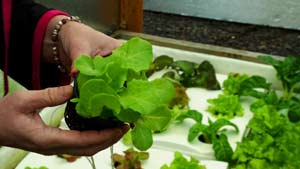by Kathleen Bauer
Growing up, Ann Forsthoefel’s family owned a small, three-acre parcel of land that supplied most of the family’s food. She joked that her mother invented permaculture, the au courant term for caring for the land and the animals, insects and plants that live on it, because it was the only way she knew how to farm in the days before corporate agriculture took over the food system.
Now, her home on a standard city lot in Portland has more raised beds and chicken runs than lawn, and she started a CSA (community supported agriculture) for her neighbors during the growing season. There’s also the burbling sound of water, but instead of a typical backyard water feature, it was coming from structures filled with flourishing plants fed by water pumped from nearby fish tanks, even on a cold day in late winter.
It’s obvious she’s excited by small scale aquaponics, the growing of plants fed by nutrients from fish, which in turn provide a source of food when they reach maturity.
“There are so few inputs compared to growing crops in the soil,” she said. With her gardens, she’s constantly building up the soil that is depleted at the end of each growing season. The beauty of aquaponics, she said, is that there isn’t that constant work because the fish are giving nutrients to the plants.
Forsthoefel said that another surprising benefit is how quickly plants grow when they’re fed the nutrient-rich water. She’s experienced four times greater yield from her vegetables, including kale, peppers, tomatoes and cucumbers, her plants grow three times faster and, in the mild climate of the Willamette Valley, she’s able to grow them year round.
When questioned about how aquaculture might work in colder climates, she takes inquisitors down her basement stairs to a room where there are tanks of fish growing in large tubs and lush vines of tomatoes and cucumbers twining their way around the rafters under grow lights. This is the aquaponics headquarters for Aqua Annie.
While she doesn’t regard aquaculture as a panacea that will feed the burgeoning world population, Forsthoefel feels it could fill an important gap in the food system.
“Here in Portland, we consider ourselves the foodie capital of the world and yet, of the produce we consume, 95% comes from outside of our region,” she said. “Just look at the agriculture leakage on the economy alone!
“If we started growing what we ate in our cities, I think we could turn unemployment numbers totally around, let alone our health issues, let alone everything else.”
Kathleen Bauer is a freelance writer in Portland, Oregon, focusing on agriculture and field-to-plate issues. Her blog, Good Stuff NW, is about her journey to connect the dots between what happening in the field and what she’s putting on her table, including stories about people who are making a difference in our local food system, about eating sustainably and locally, and about the political issues affecting the food we find at our markets and stores.
Most of the videos featured on Cooking Up a Story were produced, filmed, and edited by Rebecca Gerendasy. Fred Gerendasy contributed as a writer to many of the posts and occasionally as the interviewer. Visit Rebecca Gerendasy Clay – Art and Fred Gerendasy Photography to see their current work.

